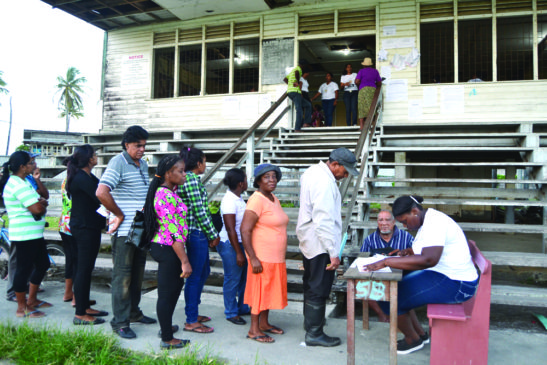
Chief Elections Officer Keith Lownfield said that the Elections Secretariat will be moving to obtain more analytical data from the results of the March 2, 2020 General and Regional Elections.
Speaking at a press conference on Friday, Lowenfield underscored the need to take elections management to a place where data from polling day is more than just who won and lost. He explained that post-elections, after obtaining the final result figures, the ballot boxes are locked away.
But, he noted, this is something that will have to change.
“We don’t go back to the boxes post-elections and for example, the boxes I have from [2015 elections] it’s locked away until year is done. But clearly it’s a move we can make,” Lowenfield posited.
According to the Chief Elections Officer, previous Chairmen of the Guyana Elections Commission (GECOM), particularly Dr Steve Surujbally, have been pushing to get more specific details from the results of the elections such as the number of youth votes and other categories of grouping.
“We need data to emerge from these elections. Youths; in particular areas – the largest turnout. Well we get a general turnout but specifics. How many persons used their ID [identification] cards in let’s say Region Four (Demerara-Mahaica) and in which are the areas. We have not done that as an agency and I agree with those who want us to move in that direction so that we will have not only who won or lost [the elections] but specific data…,” Lowenfield stated.
GECOM’s resolve to undertake better elections management comes on the heels of numerous and repeated recommendations over the years to undergo reforms.
In fact, elections observer groups both internationally and regionally have been insisting that while GECOM’s purpose for existence is to administer free and fair electoral processes, Guyana should consider reforms that would reduce or eliminate the politicised composition of the elections body in order to ensure independence and impartiality.
Currently, the elections oversight body is comprised using the Carter Center model that was introduced for the 1992 elections to guide the composition of GECOM. This model provides for three members each from Government and the Opposition, and the Chairman to be appointed by the President from a list of names submitted to him by the Opposition, a process which many say have since exhausted its usefulness.
Another area that GECOM has come under heavy criticism over the years for is its failure to deliver timely elections results.
In fact, former Indian High Commissioner to Guyana, Venkatachalam Mahalingam, in June had told this publication that the country needs to have better tabulation and compilation processes so as to reduce the lengthy delays in delivering the polling results.
Mahalingam had observed the 2015 General and Regional Elections as well as two Local Government Elections – 2016 and 2018 – during his five-year tenure and as such, noted that fast-tracking the tabulation process and the way in which the results from each polling station get to the elections headquarters could ensure the timely delivery of elections results.
“I’ve seen definitively [the delays in declaring elections results here]. It’s not desirable for the anxious voters to wait for a week to get to know their results because it can lead to other complications. So, therefore, it is advisable, and it is better, to have to a better system of compilation of the votes from each polling centre to a centralised location in a secured way, which can be used for declaring the results in the fastest way possible,” the Indian diplomat asserted.
However, he noted that while it is up to Guyana to decide on whether to pursue e-voting, finding a less time consuming and efficient way of tabulating elections results would be an “extremely useful step” for Guyana at this point in time in the absence of electronic voting.
The Indian High Commissioner is not the only foreign diplomat to recommend faster tabulation of elections results in Guyana. Last year, former United States Ambassador Perry Holloway had also touted the idea.
“I’m still a big believer that electronic tabulation can go a long way towards getting the results quicker… It would be nice to be able to almost have near or as close as to instantaneous [results] as you could… I think electronic tabulation go a long way for that and I think it’s a way to ease in the greater electronic voting… The tabulation, I think, is very doable and I think it’s a way to get started,” Holloway had contended.
The need for electoral reform, and Constitution reform as a whole, has long been highlighted and during its campaign trail leading up to the 2015 elections, where which got it into office, the APNU/AFC coalition had committed to have these reforms but is yet to take tangible steps to do so – something which it has received much criticism for.



